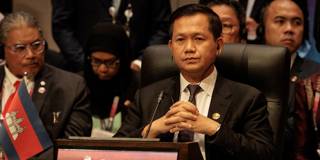Since former Cambodian Prime Minister Hun Sen transferred power to his eldest son, Hun Manet, last August, the government has continued to clamp down on democratic rights and court Chinese investment. The West must use the tools at its disposal to hold Cambodia’s dynastic autocracy accountable for its abuses.
SAN FRANCISCO – Although 2024 is being heralded as a banner year for elections, with dozens of countries – representing more than half the global population – holding polls, for some it marks the nadir of democracy. Cambodia is one such case.
Last July, after nearly 40 years in power, then-Prime Minister Hun Sen announced that he would transfer power to his eldest son, Hun Manet. The hereditary succession was preceded by national elections that Hun Sen’s ruling Cambodian People’s Party (CPP) claimed to have won by a landslide; but the United States declared the vote as “neither free nor fair,” while European Union officials said it was “conducted in a restricted political and civic space.” Since then, however, the international community has more or less accepted Cambodia’s dynastic autocracy.
Like his father before him, Hun Manet has sought to assert control over Cambodians by interfering in their daily lives. In March, for example, the new prime minister banned musical vehicle horns, which, as videos on social media have shown, encourage people to dance on the streets. Authorities fear that such public displays of joy could cause civil unrest.

SAN FRANCISCO – Although 2024 is being heralded as a banner year for elections, with dozens of countries – representing more than half the global population – holding polls, for some it marks the nadir of democracy. Cambodia is one such case.
Last July, after nearly 40 years in power, then-Prime Minister Hun Sen announced that he would transfer power to his eldest son, Hun Manet. The hereditary succession was preceded by national elections that Hun Sen’s ruling Cambodian People’s Party (CPP) claimed to have won by a landslide; but the United States declared the vote as “neither free nor fair,” while European Union officials said it was “conducted in a restricted political and civic space.” Since then, however, the international community has more or less accepted Cambodia’s dynastic autocracy.
Like his father before him, Hun Manet has sought to assert control over Cambodians by interfering in their daily lives. In March, for example, the new prime minister banned musical vehicle horns, which, as videos on social media have shown, encourage people to dance on the streets. Authorities fear that such public displays of joy could cause civil unrest.